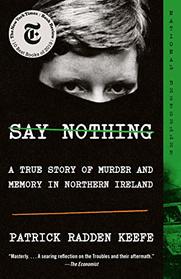This nonfiction study of "The Troubles" in Northern Ireland in the late 1960s/early 1970s is for the hard-core student of the era. For the casual reader, it's just too detailed and glacially paced.
It was a cold December night in 1972 in Belfast, Northern Ireland. A 38-year-old widowed mother of 10 named Jean McConville was with her children in their apartment in the Divis Flats, a labyrinthine public housing project that one critic described as a "slum in the sky." There was a knock at the door and a gang of masked intruders burst in. They ordered Jean to put on her coat and pulled her out of the apartment. The children became frantic, screaming and grabbing at their mother as she was taken away. This was the last time they saw her. Jean's disappearance was one of the most notorious Troubles incidents in Northern Ireland. Her body was discovered in 2003, and her death remains unsolved.
McConville's disappearance at the hands of the Irish Republican Army is "merely" the mystery at the center of a web of disturbing stories. Smoothly wound together, they compose an epic account of the Troubles in Northern Ireland. This is the bloody sectarian conflict between Catholics and Protestants that extended from the late 1960s to the Good Friday peace accord of 1998. Through her story, McConville's legacy lives on, as a symbol of the tragedy, injustice, and violence that plagued Northern Ireland for almost three decades. It is a reminder of the consequences of conflict and the importance of peace and understanding.
Keefe is a masterful storyteller who brings out the nuance and humanity in the seemingly intractable conflict between Britain and Ireland. He captures the complexities of a historical moment by digging deep into the lives of people on all sides of the conflict. Keefe spotlights everyone from Gerry Adams, the former Sinn Fein politician to Frank Kitson, the British chief army intelligence officer, whom the IRA called the "Butcher of Belfast." The author does not shy away from heartbreaking topics or uncomfortable questions. His writing shows all sides to this complex issue.
Keefe escorts readers through the fetid corridors of Long Kesh prison, where IRA hunger strikers, like Bobby Sands, died. He also ushers us into the elite precincts of the "Treasure Room" of Boston College Library, where oral history recordings that hold clues to McConville's fate are archived. However, in the face of intimidation and violence, Keefe is determined to uncover the truth, no matter the cost. He interviews former IRA members, using the recordings to piece together the events leading up to McConville's disappearance. His search leads him to an answer he never expected.
All the while, Keefe is attuned to Irish culture's fascination with repression and martyrdom. His book's title refers to the wary silence of the Troubles, as well as to lines from a poem by Seamus Heaney called "Whatever You Say, Say Nothing," in which he describes: "the famous/Northern reticence, the tight gag of place ..." The Troubles, a period of civil unrest and conflict in Northern Ireland, was characterized by deep-rooted mistrust between the two main communities in the region.
I enjoyed this book because it provides an intimate and heartbreaking look at the Troubles in Northern Ireland. The book captures the struggles of a divided society and the impact of violence on its people. It also highlights the power of human resilience and the hope of a peaceful future. The book became overwhelming and I had difficulty keeping track of the different players in the events. However, that is my fault as a reader and not the author's fault as the writer. All in all, it was a fascinating read and I would recommend it to anyone who is interested in the Troubles or in human resilience.




